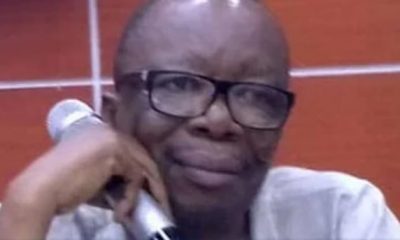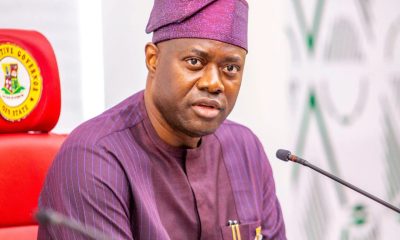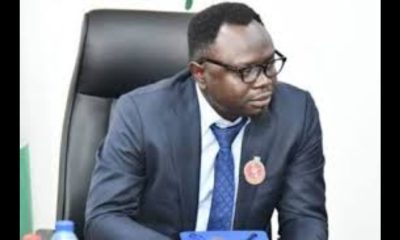Metro
ASUU: State Varsities Pull out Due to Threats from Employers – Stakeholders
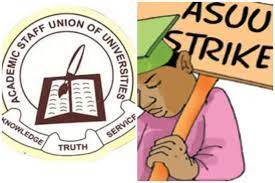
Some stakeholders have continued to react to the pulling out of some state universities from the ongoing indefinite strike by ASUU, saying they pulled out due to threats from their employers.
They made this known in separate interviews with the reporters in Abuja on Tuesday.
It would be recalled that some state universities such as the Kaduna State University, (KASU), Ekiti State University (EKSU) and the Nasarawa State University, Keffi have pulled out of the ongoing indefinite strike actions by ASUU.
While other state universities refused to join the nationwide strike, they include Osun, Rivers, Delta, Borno, Anambra, Kwara, Akwa Ibom states and the three universities owned by Lagos State.
Dr Oluremi Oni, a lecturer in the University of Maiduguri (UNIMAID) said that the pulling out by state universities from the strike would not in any way affect the structure of the union.
Oni, who blamed ASUU for bringing state universities into the issues affecting federal universities, said their pulling out was actually proper.
According to her, no matter how many state universities that pulled out of the struggle, this will not affect our collective desire to protect the country’s educational system.
“Government has shown that they don’t like ASUU; when a similar thing happened last year, ASUU gave the government the presentation and they picked the one they could honour and threw it back at ASUU and ASUU was okay with them at that time.
“So it was because of government’s inability to implement the agreement last year that made ASUU to go back to strike.
“Government did not implement what it promised us and now they are expanding the problem and the public does not even know what the problem is and everybody is blaming ASUU,” she said.
Oni expressed concern over the action of government’s intention to extend the meeting with the union till June 2023, saying that this showed lack of commitment to education.
On the ‘no work, no pay’ stands by the government on ASUU, she blamed the government on this approach, saying that the union took the decision on behalf of the generality of Nigerian children to have quality education not minding the fact that their children were also affected.
“The government has forgotten that ASUU members also have children in these universities and so members are also losing.’’
The Secretary, Workers and Youths Solidarity Network (WYSN), Mr Damilola Owot called on the leadership of ASUU to re-emphasise the benefits of the strike to state workers with a view to giving them reasons to maintain the tempo and not to relax.
According to him, ASUU should pay special attention to specific needs of the state universities too and incorporate them into their future demands.
“We extend our solidarity to the members of the ASUU who are currently on strike.
“The decision of some state universities to pull out of ASUU could largely be linked to threats from their respective employers – state governments.
“The demands are clear and vivid; honour agreements, pay salary arrears and adopt UTAS.
“We believe that both the State and Federal workers stand to benefit from the concessions,” he said.
Meanwhile, the National Coordinator, Congress of University Academics (CONUA), Dr Niyi Sunmonu insisted that the liberalisation of academic unions was the only way out to end incessant strikes in universities.
Sunmonu said the liberalisation would engender cross-fertilisation of ideas, nurture healthy competition and protect the interests of all stakeholders hence there would be no need for strike.
“Freedom of association is enshrined in the Constitution of the Federal Republic of Nigeria.
“And as long as that provision still exists in the constitution, Nigerian citizens are freeborn and they can operate under it to freely associate.
“We hope that the freedom of association will continue to help the advancement of learning in our universities,” he said.
Also, the former National President, National Association of Nigerian Students (NANS), Mr Sunday Asefon had previously called on state-owned universities to opt out of the action.
Asefon said that ASUU had lost the support of Nigerian students given the unpatriotic disposition displayed by them in extending their strike indefinitely.
Asefon said students would no longer support the union’s call for intervention, while accusing the body of being self-serving.
“We have taken the time to review the decision of ASUU to declare an indefinite strike after the ongoing six-month strike.
“We consider the decision as not only unpatriotic, unnecessary but wicked and definitely not in the interest of our nation or the tertiary education system in Nigeria.
“We call on state governments to forthwith liaise with Vice-Chancellors of state institutions to announce the resumption of academic activities and grant the vice-chancellors authority to enforce the resumption.
“State universities should never have joined the strike in the first place,” he said. (NAN)
Metro
Tinubu Seeks Collective Action on Regional Cooperation in Africa
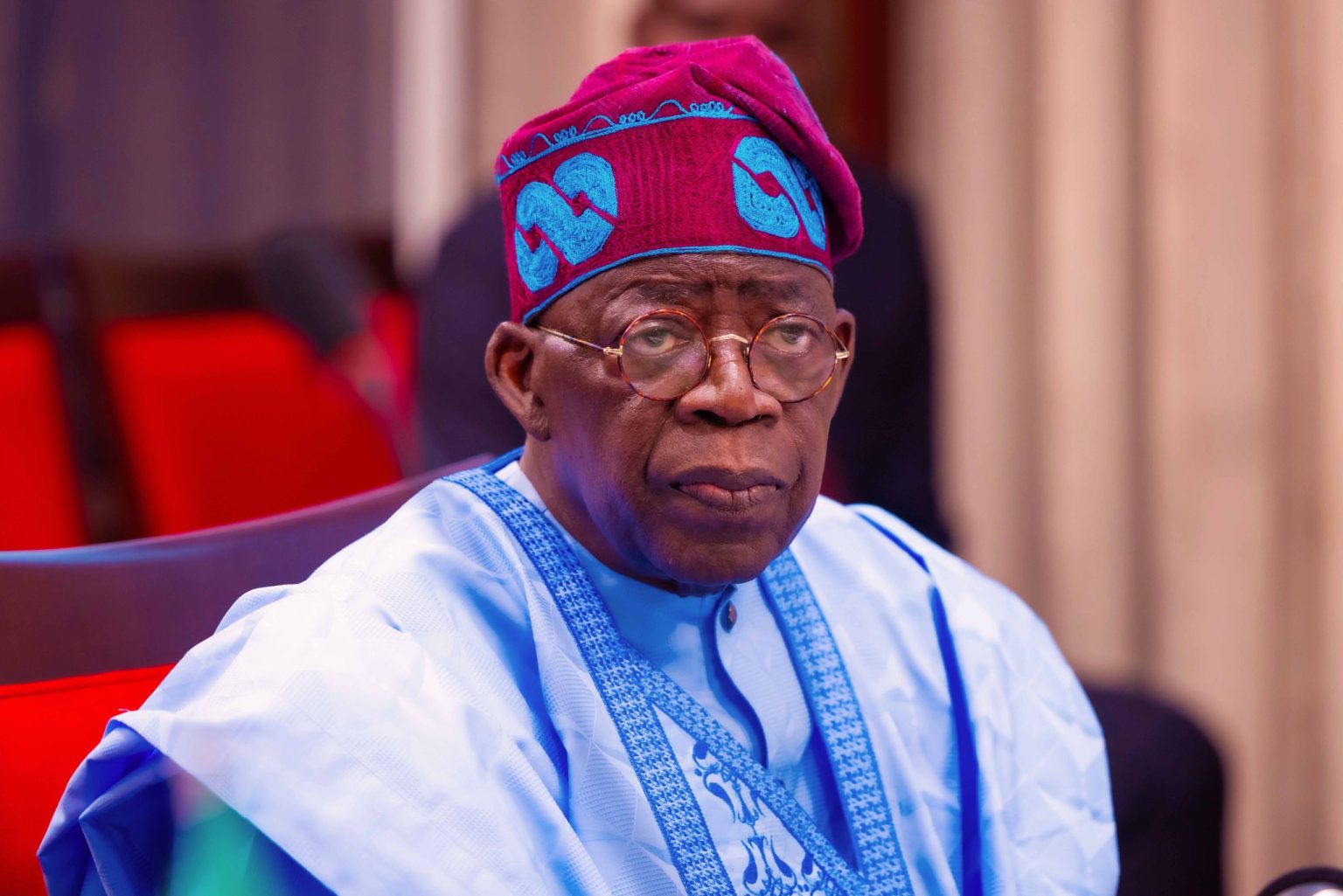
President Bola Tinubu on Monday in Abuja called for collective action and regional cooperation among African countries in actualizing transformative development on the continent.
Tinubu, represented by Vice-President Kashim Shettima, made the call while declaring open the Fourth Annual Meeting of Africa Sovereign Investors Forum (ASIF), hosted by Nigeria Sovereign Investment Authority (NSIA).
He said that shrewd utilisation of sovereign wealth funds was crucial in the ongoing efforts to close the infrastructure gap, build climate change resilience and create job opportunities for the growing youth population on the continent.
The president said that the forum’s meeting, with the theme: “Leveraging African Sovereign Wealth Funds to Mobilise Global Capital for Transformative Development in Africa,” was timely.
According to him, the meeting is holding at a time the world is witnessing rapid transformation and is under pressure to think outside the box.
Tinubu said that it was time to position the continent to seize the opportunities rooted in the wave of global change.
He urged African nations to take a cue from evolving sovereign wealth funds across the world, which had moved beyond serving as mere fiscal buffers to becoming architects of national transformation.
“Our future lies not in working in silos but in pursuing regional cooperation and collective ambition.
“Our sovereign wealth funds must become the anchors for pan-African investment platforms that de-risk projects, standardise processes and deliver sustainable outcomes at scale. This is not just a strategy. This is a necessity,” he stated.
The president acknowledged the fact that Africa is currently facing a development dilemma, as it contends with limited fiscal space, amid growing expectations and demands for long-term capital to fuel inclusive and sustainable growth.
He, however, identified creativity as a solution to the puzzle.
“There can be no greater inspiration to re-imagine how we invest in setting up critical infrastructure, strengthening our climate resilience, promoting food security through agricultural innovation, supporting micro, small and medium enterprises or embracing digital economy to create jobs and expand opportunity.
“None of these is possible without catalytic institutions that combine strategic foresight with sound financial discipline.
“This is why the Nigeria Sovereign Investment Authority stands not only as a steward of our sovereign capital but as a vehicle for the delivery of strategic infrastructure.
“It is a catalyst in our national quest to redeem renewable energy, healthcare, agriculture and much more. It is also a hub for pioneering innovative capital mobilisation solutions tailored to the realities of our continent,” he said.
Tinubu noted that ASIF had the pan-African apparatus to harness the collective strength of the continent’s sovereign investment institutions, just as he maintained that the time to act was now.
“We must act and act now to close the infrastructure gap, build resilience to climate change and create jobs for our expanding youth population.
“This is precisely why platforms like the Africa Sovereign Investors Forum are not just relevant but essential.
“ASIF offers a pan-African mechanism to harness the collective strength of our sovereign investment institutions.
“It gives us the power to share knowledge, co-invest across borders and speak with a unified voice in the global financial ecosystem.
“Through this kind of collaboration, we will attract the scale of capital required to unlock Africa’s latent potential,” he stated.
The Managing Director of NSIA, Mr Aminu Umar-Sadiq, said that the meeting would focus on how African sovereign wealth funds could achieve three things through effective domestic, continental and global partnerships.
The first one, Umar-Sadiq said, was how Africa could offer the right balance between the risk-takers and the conservative investors managing wealth for future generations in Africa.
“Secondly, how we can collectively co-create a sustainable investment vehicle that can mobilise global capital at scale to channel towards propositions that offer as much emphasis on commercial returns.
“Thirdly, how we can position ourselves as the preferred financial and strategic partners of choice, with the right blend of domestic influence and capital for global investors seeking market exposure in our respective sovereigns,” he said.
The managing director said it was ASIF’s hope that the forum would serve as the catalyst to turn the ‘perfect blend of expertise’ into actionable, transformative outcomes.
Minister of Finance and Coordinating Minister of the Economy, Mr Wale Edun, listed priorities for the stakeholders at the forum.
Edun said that the priorities included: capital mobilisation at scale, regional and intercontinental collaboration, human capital and policy alignment, saying that they were critical for transformative development across the continent.
He said that the ASIF meeting would birth significant transactions that could mobilise the required resources, drive economic transformation across Africa, forge impactful partnerships and build a sustainable future.
President of AfreximBank, Prof. Benedict Oramah, emphasised the need for stakeholders to keep African sovereign wealth funds on the continent by investing in domestic markets.
Oramah noted that the forum could help reshape Africa’s development financing in a manner that would give the continent greater opportunity to determine its developmental trajectory.
Also speaking, Chairman of African Sovereign Investors Forum (ASIF), Mr Obaid Amrane, expressed the forum’s commitment to facilitating the participation of sovereign investors in Africa’s transformation.
He said that in just three years, ASIF had made significant strides in enhancing Africa’s global positioning and closing the infrastructure funding gaps across the continent.
A Pan-African activist, Prof. P.L.O. Lumumba, called on leaders across Africa to leverage huge resources domiciled in the continent to invest in the future of the unborn generations.
According to him, it is an intergenerational duty for political and economic leaders on the continent to cater for unborn generations.
Lumumba noted that Africa’s resources were inexhaustible and that leaders must invest in the future of the generations to come. (NAN)
President Bola Tinubu on Monday in Abuja called for collective action and regional cooperation among African countries in actualising transformative development on the continent.
Tinubu, represented by Vice-President Kashim Shettima, made the call while declaring open the Fourth Annual Meeting of Africa Sovereign Investors Forum (ASIF), hosted by Nigeria Sovereign Investment Authority (NSIA).
He said that shrewd utilisation of sovereign wealth funds was crucial in the ongoing efforts to close the infrastructure gap, build climate change resilience and create job opportunities for the growing youth population on the continent.
The president said that the forum’s meeting, with the theme: “Leveraging African Sovereign Wealth Funds to Mobilise Global Capital for Transformative Development in Africa,” was timely.
According to him, the meeting is holding at a time the world is witnessing rapid transformation and is under pressure to think outside the box.
Tinubu said that it was time to position the continent to seize the opportunities rooted in the wave of global change.
He urged African nations to take a cue from evolving sovereign wealth funds across the world, which had moved beyond serving as mere fiscal buffers to becoming architects of national transformation.
“Our future lies not in working in silos but in pursuing regional cooperation and collective ambition.
“Our sovereign wealth funds must become the anchors for pan-African investment platforms that de-risk projects, standardise processes and deliver sustainable outcomes at scale. This is not just a strategy. This is a necessity,” he stated.
The president acknowledged the fact that Africa is currently facing a development dilemma, as it contends with limited fiscal space, amid growing expectations and demands for long-term capital to fuel inclusive and sustainable growth.
He, however, identified creativity as a solution to the puzzle.
“There can be no greater inspiration to re-imagine how we invest in setting up critical infrastructure, strengthening our climate resilience, promoting food security through agricultural innovation, supporting micro, small and medium enterprises or embracing digital economy to create jobs and expand opportunity.
“None of these is possible without catalytic institutions that combine strategic foresight with sound financial discipline.
“This is why the Nigeria Sovereign Investment Authority stands not only as a steward of our sovereign capital but as a vehicle for the delivery of strategic infrastructure.
“It is a catalyst in our national quest to redeem renewable energy, healthcare, agriculture and much more. It is also a hub for pioneering innovative capital mobilisation solutions tailored to the realities of our continent,” he said.
Tinubu noted that ASIF had the pan-African apparatus to harness the collective strength of the continent’s sovereign investment institutions, just as he maintained that the time to act was now.
“We must act and act now to close the infrastructure gap, build resilience to climate change and create jobs for our expanding youth population.
“This is precisely why platforms like the Africa Sovereign Investors Forum are not just relevant but essential.
“ASIF offers a pan-African mechanism to harness the collective strength of our sovereign investment institutions.
“It gives us the power to share knowledge, co-invest across borders and speak with a unified voice in the global financial ecosystem.
“Through this kind of collaboration, we will attract the scale of capital required to unlock Africa’s latent potential,” he stated.
The Managing Director of NSIA, Mr Aminu Umar-Sadiq, said that the meeting would focus on how African sovereign wealth funds could achieve three things through effective domestic, continental and global partnerships.
The first one, Umar-Sadiq said, was how Africa could offer the right balance between the risk-takers and the conservative investors managing wealth for future generations in Africa.
“Secondly, how we can collectively co-create a sustainable investment vehicle that can mobilise global capital at scale to channel towards propositions that offer as much emphasis on commercial returns.
“Thirdly, how we can position ourselves as the preferred financial and strategic partners of choice, with the right blend of domestic influence and capital for global investors seeking market exposure in our respective sovereigns,” he said.
The managing director said it was ASIF’s hope that the forum would serve as the catalyst to turn the ‘perfect blend of expertise’ into actionable, transformative outcomes.
Minister of Finance and Coordinating Minister of the Economy, Mr Wale Edun, listed priorities for the stakeholders at the forum.
Edun said that the priorities included: capital mobilisation at scale, regional and intercontinental collaboration, human capital and policy alignment, saying that they were critical for transformative development across the continent.
He said that the ASIF meeting would birth significant transactions that could mobilise the required resources, drive economic transformation across Africa, forge impactful partnerships and build a sustainable future.
President of AfreximBank, Prof. Benedict Oramah, emphasised the need for stakeholders to keep African sovereign wealth funds on the continent by investing in domestic markets.
Oramah noted that the forum could help reshape Africa’s development financing in a manner that would give the continent greater opportunity to determine its developmental trajectory.
Also speaking, Chairman of African Sovereign Investors Forum (ASIF), Mr Obaid Amrane, expressed the forum’s commitment to facilitating the participation of sovereign investors in Africa’s transformation.
He said that in just three years, ASIF had made significant strides in enhancing Africa’s global positioning and closing the infrastructure funding gaps across the continent.
A Pan-African activist, Prof. P.L.O. Lumumba, called on leaders across Africa to leverage huge resources domiciled in the continent to invest in the future of the unborn generations.
According to him, it is an intergenerational duty for political and economic leaders on the continent to cater for unborn generations.
Lumumba noted that Africa’s resources were inexhaustible and that leaders must invest in the future of the generations to come. (NAN)
Metro
June 12: Tinubu Carries Abiola’s Democratic Touch – Shettima

Vice-President Kashim Shettima says history has returned the baton of democratic struggle to late Moshood Abiola’s trusted ally, President Bola Tinubu, decades after June 12.
Representing President Tinubu, Shettima stated this on Thursday at the Democracy Day lecture held at the Presidential Villa, Abuja, marking Nigeria’s 26th anniversary of democracy.
He described the late Abiola as a patriot who gave everything for Nigeria, saying Abiola’s sacrifice became the guiding light of the country’s democratic journey.
The Vice-President noted that hope remains an enduring part of Abiola’s legacy, a flame that could neither be extinguished nor ignored in history’s account.
He added that belief in Abiola’s vision has renewed national hope in what he described as the great theatre of providence.
According to him, Abiola’s dream did not die in vain but became a national covenant and enduring resolve among Nigerians.
“Abiola’s dream inspired Nigerians to uphold what is right, defend electoral choice, and honour the sacrifices that built the roots of our democracy.
“This faith in Abiola’s promise has renewed hope for Nigeria.
“In the great theatre of providence, history returns the baton to Abiola’s ally in democracy’s struggle —President Tinubu.
“The ticket once denied Nigerians — the Abiola-Kingibe ticket — finds reflection and vindication in Tinubu’s leadership, mirroring its spirit and conviction.
“Tinubu, a leader who has preserved democracy’s flame through years of fire and storm.
“I’m honoured to share the weight of this history and the depth of its memory,” Shettima said.
He said Nigeria stands today on sacrifices of unsung heroes—those who gave up comfort, freedom, and life for democratic values.
“Nigerians, including myself, remain thankful to serve in a government that listens to all voices.
“There is no doubt Tinubu honours that covenant — reaching across divides to build a nation for all,” Shettima noted.
He said Abiola’s life shows that democracy’s burden is not a lone man’s task but a shared national responsibility.
He urged Nigerians to unite and guard democracy as a fortress that no force of anarchy can breach—even in thought.
Shettima called for strong support for Tinubu’s Renewed Hope Agenda across the nation.
“Each of us has a sacred duty to support the President in renewing hope, deepening democracy, and institutionalising governance,” he said.
Earlier, Secretary to the Government, Sen. George Akume, recognised heroes of Nigeria’s democratic struggle.
He praised their lasting legacies, democratic contributions, and efforts to reshape the national economy.
He encouraged stakeholders to embrace democratic ideals by supporting Tinubu’s efforts towards peace, growth, and prosperity.
Delivering the keynote, Prof. Samuel Egwu said the core of democracy globally is sustained commitment.
He noted that democracy’s full benefits in Nigeria require consistent commitment by citizens and leaders alike.
Egwu added that deepening 26 years of democracy demands officeholders prioritise citizens’ welfare over personal interest.
Cameroon’s High Commissioner, Mr Salaheddine Ibrahim, praised Nigeria’s unity in spite of its challenges.
He urged leaders and citizens to remain resolute in preserving democracy in Nigeria.
Gov. Hope Uzodinma of Imo said recognising June 12 as Democracy Day reflects national will and sacrifice.
He emphasised that democracy thrives not on rituals, but on collective effort, resilience, and continued participation.
The event also featured the unveiling of three books: ‘Tinubunomics’, ‘Leading With Courage’, and ‘Turning Challenges into Opportunities’. (NAN)
Metro
Tinubu’s Reforms Synonymous with June12 –APC chair

Mr Cornelius Ojelabi, the chairman, All Progressive Congress (APC) Lagos State chapter says President Tinubu is synonymous with the June 12 phenomenon,
He said on Thursday in Lagos that this was evident in Tinubu’s peoples-oriented reform agencga emancipation.
Ojelabi, congratulated Nigerians on the occasion of the Democracy Day and urged them to support the administration’s ongoing reforms to encourage the government to execute more people- oriented programmes.
Ojelabi spoke during an interview on the sidelines of the Cherubim and Seraphim Society centenary celebrations.
The party stewart described Tinubu as a democrat whose nationalistic disposition dwarfed his shortcomings.
According to him the president symbolises the struggle which took place 26 years ago and unified Nigerians in pursuit of their democracy dreams.
“The expression in MKO Abiola and Baba Gana Kingibe ticket resonates in the present Tinubu-Shittima dispensation.
“It has continued to deliver to Nigerians reforms such as students loan and improved National Youth Service Corps members’ allowance.
“It has also manifested in the liberalisation of the oil sector to foster healthy competition essential to bringing price down in the domestic market.
“Infrastructure development is evenly being executed nationwide to attract both local and foreign investments,” he said.
The politician said that, the leadership of the nation was not unaware of some grey areas that required attention.
He said that efforts were being made to stamp out insecurity in the country with more investment in the nation’s military, adding that very soon the security challenge would be history.
He said that the reforms of the present administration were segmented into short, medium and long term.
According to him, when the long term reforms matured their derivatives would wipe out the sacrifices made to achieve them. (NAN)






